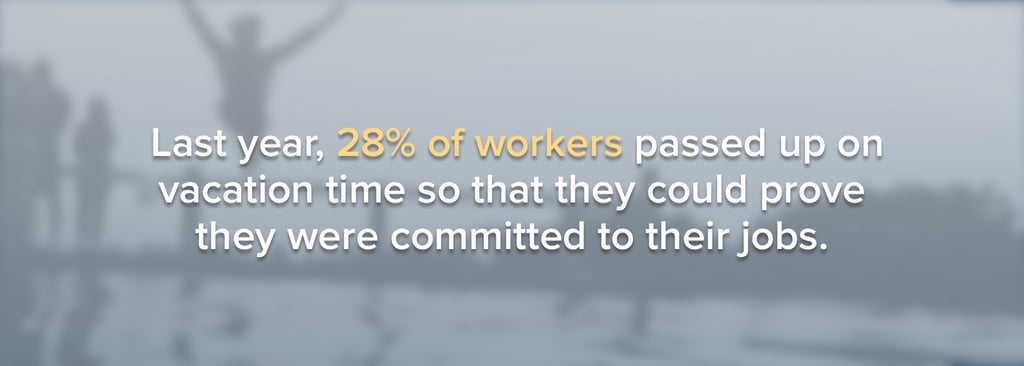How to plan a stress-free vacation from your small business
When you own a business, it’s nearly impossible to clock out at 5pm and not take your work worries home. The same goes for taking time off.
If you find yourself making excuses for why you can’t get away, you’re not alone. 135 million Americans have not had a vacation in the past 12 months. Time off isn’t an indulgence, it’s a necessity. For many, working long hours without a break causes stress, which can lead to depression, at an estimated cost of $79 billion to the workplace. Just as exercise and eating vegetables are vital to your wellbeing, a vacation can be a boost to your health.

A beachy paradise can be ruined if you have a Corona in one hand, iPhone in the other, scrolling through email. Squeezing in work on furlough can leave you feeling even more stressed when you come back. In a time where mobile devices give us constant connectivity, the expectation of an immediate reply can make it hard for business owners to get (and stay) away.
So, how can you take a real break without fearing you’ll come back to complete chaos? Let’s make a list of reasons why you can’t leave (aka excuses!) and deflate them:
Excuse 1: I’m just too busy!
A survey found that 30% of Americans say they are too busy to take a vacation. You can blame the American workaholic culture. It’s not that we don’t want to have a holiday, it’s that we’re afraid to. We’re obsessed with productivity and working long hours to show our dedication, even though studies show that productivity goes down significantly as we work longer than 40 hours each week.
For the sake of your health, you owe yourself a break. The New York Times’ guide on how to take a vacation from your business expresses, “If you don’t get a break, you’re going to burn out, and you’ll never achieve the level of success you’re aiming for.” And psychological studies show that taking a vacation is linked to a longer, more satisfied life. So, take a break for your mind, body, and business.
The Fix: Plan your vacation around periods that are typically slower for your business. For example, many hotels and inns are busiest in the summer months when kids are out of school and ready to road trip, so a Thanksgiving or Christmas trip is a better bet for a quiet time to get away. On the flip side, gym activity typically peaks in January while summer months can be dead, so a summer vacation is no problem.
Excuse 2: I’ll have even more work piled up when I return!
When asked, “what’s a big reason why you haven’t taken extended time off work?” forty percent of people polled said they were afraid of the work they’d have to do when they got back. It seems that business owners haven’t put in place processes so that they can leave their job, even for a short break to re-energize.
The Fix: Planning ahead and delegating responsibilities will give you peace of mind while you’re swinging in a hammock in Cancun. You can ease the pain of coming home by making a list of what you will need to do once you’re back. Plus, it’ll be a reminder for your case of vacation brain. If you have staff who can take on some of your day-to-day tasks, start training them in advance. Can your assistant take on payroll? Do you have a lead who can take on the responsibility of putting out fires, like a last minute staff reschedule? If you’re the sole proprietor, take an extra hour or so each day a week or two ahead of time to take on projects, and possibly even get them done, before deadline.

Excuse 3: My staff may not be able to handle everything while I’m gone!
If you’re like most entrepreneurs, you take on plenty of responsibility—sometimes more you than you can handle. Your business is your baby and you want to make the right decisions every step of the way. But when sick days, honeymoons, or family reunions come up, you can’t be on 24/7. You need to trust that your staff and your business can run smoothly without you for a short time. Part of this is hiring a top-notch staff (with these hiring best practices).
The Fix: Train your employees to make the right call when decisions come up. If they’re prepped with the information they need to do their job, you’ll have confidence that they will get the job done. Give your employees more responsibility while you’re still there (long in advance). A test run eases your worries and helps ensure that panic won’t set in once they’re left on their own. Go over potential problems that could happen and give steps on how to deal with them.
Excuse 4: I might lose potential business!
Are you putting off relaxing because you’re nervous you may alienate customers? Afraid that something could go wrong or that you’ll miss out on business since you’re not there to oversee everything? Business News Daily writes that “Owners like to be the decision makers. They need to be needed. It's a challenge, but it's liberating to see a company running itself for a [short time] without their constant oversight.”
The Fix: Inform and set expectations. Let your customers know you will be taking a vacation and how long you’ll be off the grid. Build a schedule into your plan to make sure the work gets done on par with expectations. Also let them know that if something urgent pops up that they should definitely reach out to you. A few weeks is enough time to send out a note, then send a follow up reminder a few days before you leave.
Excuse 5: I need to be connected just in case
You don’t need to prove your dedication. Last year, 28% of workers passed up on vacation time so that they could prove they were committed to their jobs. They also didn’t want to be seen as lazy. But entrepreneurs are accountable to themselves and to their clients, so they should know full well when they deserve a vacation.
The Fix: Unplug. Leaving your devices in the bottom of your bag or even just turning off email notifications is a surefire way to avoid unnecessary stress. Checking in may seem like a way to make sure everything is going as planned, but if there’s a situation you’re not there to handle, you’re bound to feel stressed and helpless. However, if you must be connected, set a certain time during they day where you check your email or phone. You don’t want work to eat up all your vacation time, but periodic check-ins can give you vacation-business balance. Let your employees know this is the time you’ll be there to answers questions. Make sure you follow your plan or your vacation will be more like work with a pretty background.
Whether you’ve decided to snorkel your way around Maui or trek through Finland fjords, taking your next vacation should be just as exciting as planning it. The key to a successful holiday away from your small business is preparation and having processes in place so everyone-from staff to clients-know what to expect.